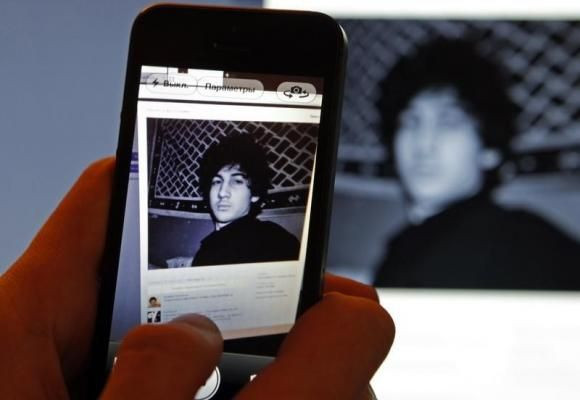Jury Selection Begins In Trial Of Accused Boston Marathon Bomber

(Reuters) - Jury selection is set to begin on Monday in the trial of the man accused of carrying out the 2013 Boston Marathon bombing that killed three people and wounded more than 260 others in the largest mass-casualty attack on U.S. soil since Sept. 11, 2001.
Dzhokhar Tsarnaev, a 21-year-old ethnic Chechen who is a naturalized U.S. citizen, could get the death penalty if convicted in federal court in Boston. He has pleaded not guilty to all 30 charges against him.
Tsarnaev, due to be in court on Monday, is accused of detonating a pair of homemade bombs placed amid a crowd of thousands of spectators at the race's finish line on April 15, 2013.
He was arrested four days after the bombing. Prosecutors say he and Tamerlan Tsarnaev, his 26-year-old brother, later shot and killed a university police officer. The brother died after a wild gunbattle with police.
Some 1,200 prospective jurors have been summoned to U.S. District Court in Boston. Judge George O'Toole will seek to winnow down that field to a panel of 12 jurors and six alternates to hear a trial expected to last three to five months.
Tsarnaev's attorneys had sought to have the proceedings moved out of Boston. They argued it would be impossible to find an impartial jury because of intense news coverage and the fact that thousands of people attended the race or hid in their homes during a day-long lockdown in the greater Boston area after the bombing.
Experts said it will be virtually impossible to find jurors unaware of the basic details of the bombing, which has already been the subject of two trials of friends of the younger Tsarnaev who were found guilty of interfering with the investigation into the attack.
"This case presents unique difficulty in terms of seating a jury that will be able to analyze the case fairly," said former federal prosecutor Thomas Peisch, an attorney with the Boston law firm Conn Kavanaugh. "This incident is seared into the consciousness of people who live in Massachusetts."
O'Toole's goal will be to find jurors able to commit to determining Tsarnaev's fate solely on the evidence they hear in court, Peisch said.
Another challenge will be finding jurors not entirely opposed to the death penalty, which is banned under Massachusetts state law but applies in this case because Tsarnaev faces federal charges.
"You can have people who are against the death penalty but are willing to vote for it in specific cases," said Boston College Law School professor Robert Bloom. "They can't be stringent in their opposition to the death penalty, but if they said they could vote for it in certain circumstances, he could pick them."The Tsarnaev brothers were Muslim ethnic Chechens whose family emigrated to the United States about a decade before the attack, settling in Cambridge, Massachusetts, just outside Boston. According to prosecutors, Dzhokhar Tsarnaev wrote messages inside of the hull of the drydocked boat where he was discovered hiding four days after the attack indicating the attack was politically motivated.
The messages included "the U.S. government is killing our innocent civilians" and "I can't stand to see such evil go unpunished," according to court papers. His lawyers are expected to argue Tsarnaev acted under the influence of his brother, a boxer also suspected of having a role in a 2011 triple murder in Waltham, Massachusetts.
Three people died in the bombing: restaurant manager Krystle Campbell, 29; graduate student Lingzi Lu, 23; and Martin Richard, 8. Massachusetts Institute of Technology police officer Sean Collier, 27, was fatally shot three days later.
(Reporting by Scott Malone; Editing by Will Dunham)
© Copyright Thomson Reuters {{Year}}. All rights reserved.





















